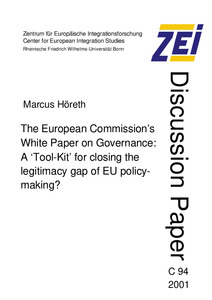Höreth, Marcus: The European Comission's white paper on governance : A "tool-kit" for closing the legitimacy gap of EU policy-making?. Bonn: Zentrum für Europäische Integrationsforschung (ZEI), 2001. In: ZEI Discussion Paper, C94.
Online-Ausgabe in bonndoc: https://hdl.handle.net/20.500.11811/10111
Online-Ausgabe in bonndoc: https://hdl.handle.net/20.500.11811/10111
@techreport{handle:20.500.11811/10111,
author = {{Marcus Höreth}},
title = {The European Comission's white paper on governance : A "tool-kit" for closing the legitimacy gap of EU policy-making?},
publisher = {Zentrum für Europäische Integrationsforschung (ZEI)},
year = 2001,
series = {ZEI Discussion Paper},
volume = C94,
note = {Reflecting on European Governance and its problems is in fashion these days. Given that the European Commission has a double function as a European executive in the “heart of the Union” and as a promoter of new ideas and concepts it is not surprising that the Commission recently contributed to the intense academic and political debate over this problem. Romano Prodi himself announced at the outset of his new 2000-2005 Commission its purpose of “promoting new forms of European governance” as one of the key strategic objectives. Obviously, given the scandals of the previous Santer Commission, this goal setting was motivated by, and was a necessary reaction to, growing concerns for the legitimacy of the Union’s framework of governance. Besides Neil Kinnock’s institutional reform programme, which is concentrated on the Commission’s internal problems, the provisional result of these broader inter-institutional reflections on governance is the publication of the White Paper.
Unfortunately, for many reasons, the White Paper’s contribution towards understanding and towards closing the legitimacy gap of European governance is not very helpful. In this paper I try to figure out the shortcomings and probably unintentional negative implications of many proposals the Commission made on the subject. It can be demonstrated that the Commission’s good intention to reinforce its role in European policy-making, both in preparing policy actions and implementing them, could do serious damage to the fragile institutional set-up of the Union. Moreover, it is likely that adopting its governance proposals could lead to an even deeper legitimacy crisis in the future than the EU is already suffering today.
I will develop my argument in three steps. First, I will give an overview on the multifarious aspects of European governance and its legitimacy problems in the shadow of the imminent enlargement. Against this background, it is easier to evaluate the usefulness of the Commission proposals culminating in the advice to “revitalise the Community method” (p. 29). Secondly, I will introduce the Commission’s approach, its problem perception and its proposed solutions. In a third step I will highlight some analytical shortcomings and overlooked negative implications of the proposals made by the Commission.},
url = {https://hdl.handle.net/20.500.11811/10111}
}
author = {{Marcus Höreth}},
title = {The European Comission's white paper on governance : A "tool-kit" for closing the legitimacy gap of EU policy-making?},
publisher = {Zentrum für Europäische Integrationsforschung (ZEI)},
year = 2001,
series = {ZEI Discussion Paper},
volume = C94,
note = {Reflecting on European Governance and its problems is in fashion these days. Given that the European Commission has a double function as a European executive in the “heart of the Union” and as a promoter of new ideas and concepts it is not surprising that the Commission recently contributed to the intense academic and political debate over this problem. Romano Prodi himself announced at the outset of his new 2000-2005 Commission its purpose of “promoting new forms of European governance” as one of the key strategic objectives. Obviously, given the scandals of the previous Santer Commission, this goal setting was motivated by, and was a necessary reaction to, growing concerns for the legitimacy of the Union’s framework of governance. Besides Neil Kinnock’s institutional reform programme, which is concentrated on the Commission’s internal problems, the provisional result of these broader inter-institutional reflections on governance is the publication of the White Paper.
Unfortunately, for many reasons, the White Paper’s contribution towards understanding and towards closing the legitimacy gap of European governance is not very helpful. In this paper I try to figure out the shortcomings and probably unintentional negative implications of many proposals the Commission made on the subject. It can be demonstrated that the Commission’s good intention to reinforce its role in European policy-making, both in preparing policy actions and implementing them, could do serious damage to the fragile institutional set-up of the Union. Moreover, it is likely that adopting its governance proposals could lead to an even deeper legitimacy crisis in the future than the EU is already suffering today.
I will develop my argument in three steps. First, I will give an overview on the multifarious aspects of European governance and its legitimacy problems in the shadow of the imminent enlargement. Against this background, it is easier to evaluate the usefulness of the Commission proposals culminating in the advice to “revitalise the Community method” (p. 29). Secondly, I will introduce the Commission’s approach, its problem perception and its proposed solutions. In a third step I will highlight some analytical shortcomings and overlooked negative implications of the proposals made by the Commission.},
url = {https://hdl.handle.net/20.500.11811/10111}
}






